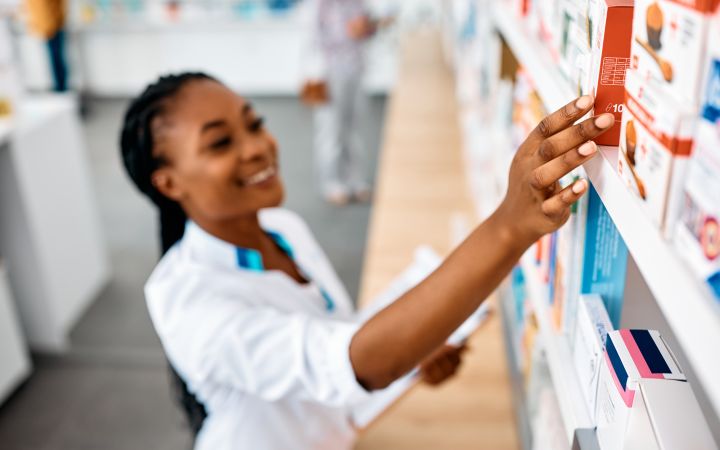- Aissata Koné, a Malian PhD student in pharmacology, joined the 2021 UNITAR Strategic Response to COVID-19 Crisis: Empowering the Sahel Region through Digital Reskilling and Upskilling to Enhance Productive Sources of Livelihood and Employment training programme.
- She wishes to revolutionize the health industry in Africa with digital technologies.
- Aissata believes that the skills she learned in this programme will help to bridge the digital gap.
- Aissata is now launching an application to help Malians find the medications they need easier.
November 2022, Hiroshima, Japan – “My dream is to set up a real pharmaceutical industry in Africa.” Aissata Koné was a participant in the 2021 UNITAR programme on digital skills for youth in the Sahel region. While studying with UNITAR, she understood the importance of digital skills in today’s world.
Aissata is a young PhD student from Mali, currently living in Senegal. Her passion for the health industry led her to pursue an education in pharmacology. While working in a hospital in Mali, Aissata saw first-hand the difficulty patients had in accessing medication. As a health professional and PhD student, Aissata found valuable information and skills in the UNITAR programme that will help her realize her personal goals.
In Mali, political and social conditions hinder women and youth from exercising their basic human rights. Aissata’s vision to create an app that helps provide medical assistance to communities has the potential to reshape customs and structural inequalities in the region.
The Sahel Region Digital Reskilling Programme
The UNITAR programme Aissata took part in was for women and youth in eight countries of the Sahel region (Burkina Faso, Cameroon, Chad, Guinea, Mali, Mauritania, Niger and Senegal). The participants were interested in digital technologies and motivated to make a positive impact on society. By the end of the course, which was delivered in French, participants were prepared to transform their entrepreneurial ideas into digital products to empower others in their communities.
The programme aimed to give the participants the necessary tools to understand and use digital technologies and taught them the basics of coding and cybersecurity. Over the 6-week programme, participants also worked on self-directed projects with locally contextualized online training. Participants also engaged with professional, regional experts and peers.
A key asset of this programme according to Aissata was flexibility: the learners were given enough time to process all the information and could work on their project at their own pace.
The future: Launching a pharmaceutical app
Aissata heard about the UNITAR programme from a friend, who, knowing Aissata’s professional projects, advised her to take part. Aissata was not familiar with digital tools before, but the programme was perfectly accessible to her and taught her the importance of digital tools in today’s economy. Aissata says she is now aware of all the progress that the Sahel countries need to achieve in the digital field and plans to use digital tools in her projects to help her community.
Indeed, Aissata is now working with two other colleagues on an app that will allow Malians, especially in the north of the country, to check on their phones which pharmacies have the medication they need. Aissata hopes that the app will reduce the unnecessary labour of physically going to multiple pharmacies in search of medications and give Malians better access to medication. She will use the skills she learned during the UNITAR programme to develop this idea.
In the UNITAR programme, Aissata particularly appreciated the modules on COVID-19 and the protection of personal data. These modules helped her improve her app and to make it safer for all future users.
She also noticed that many people in Mali did not know enough about new technologies. Therefore, she decided to start another project to build people’s digital literacy. Aissata is also deeply interested in cinema and is trained in writing and directing movies. She wants to use her passion for cinema to raise awareness in her community, as “cinema and audiovisuals have a great power”.
Aissata says:
My advice to women and young people is to get training and to look for information as it is very important to know what is happening in your country and also abroad.
She added that Africans “need to get trained in the digital field so that they will not be left behind anymore. Digital is the only way to bridge inequalities between the North and South.”
Aissata recommends the UNITAR programme for all youth of the region. It is an excellent opportunity to develop their professional projects and improve them by learning from professionals, regional experts, UNITAR instructors and peers. It effectively allows participants to add unique digital dimensions to their entrepreneurial ideas.
About UNITAR
The United Nations Institute for Training and Research (UNITAR) is a dedicated training arm of the United Nations. In 2021, UNITAR trained 370,139 learners around the world to support their actions for a better future. In addition to our headquarters in Geneva, we have offices in Hiroshima, New York, Bonn and various networks around the world.
One of the eight divisions of UNITAR, the Division for Prosperity, based in the Hiroshima Office and Geneva Headquarters, seeks to shape an inclusive, sustainable and prosperous world. World-class learning and knowledge-sharing services on entrepreneurship, leadership, finance and trade, digital technologies, and nuclear disarmament and non-proliferation are offered. We empower individuals from developing countries – especially women and young people – to address inequalities. Our alumni are making a difference in least-developed countries, countries emerging from conflict, and small-island developing states.



